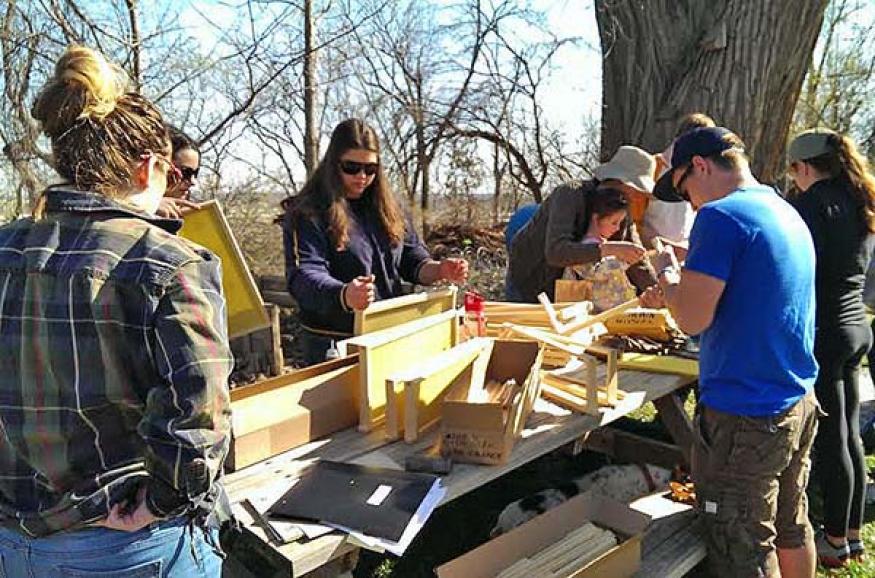
20,000 bees (with two queens) moving into Augie Acres
Earlier this spring, the Augustana Local Agriculture Society met at Augie Acres to decide on a fun, challenging project for the student-run garden.
Looking at a dilapidated, abandoned hive at the edge of the property, sophomore Jamie Fee repeated an idea she'd had last year: "Bees!"
And so Augie Acres will welcome six pounds of Carniolan bees from California during the third week of April. Six pounds is about 20,000 bees, including two queens.
The beekeeping idea had started almost simultaneously with Dr. Tierney Brosius of the biology department, who plans to use Augustana's new hives to teach in her fall-term entomology classes.
"We cover the topics of social insects, pollination and human-insect interactions, so they are perfect examples to use," she said. "I'm all about hands-on experiences, and seeing a hive opened up for the first time will be an amazing experience for students."
Dr. Brosius set about helping students with the basics of beekeeping by first taking a local class herself. "Of course I have always had a personal interest, as an entomologist," she said. "It seemed like a win-win for the campus."
Fee and her friend Cleo Bubulka, both sophomore biology majors (pre-nursing and pre-vet, respectively), will have the main responsibility of looking after the bees' welfare - with the help of Dr. Brosius and local beekeeper Phil Crandall of Crandall Farms, Inc.
"With Jamie's passion and Dr. Brosius' expertise, we figured we could do it," Bubulka said.
Everyone's abuzz
What will they actually do? First, to prepare for the bees' arrival, students repaired and painted the old hive. They purchased a second hive, bees suits and hoods using gift funds from the biology department and a "Green Grant" from the campus group Global Affect, funded by Royal Neighbors of America.
Next, with their annual seed order they added "a variety of bee-specific flowers," said Fee, including "a bunch of prairie plants, like purple coneflowers and cup flowers from the sunflower family."
Of course, the bees won't necessarily stay at Augie Acres throughout their daily rounds. They will traverse the neighborhood for flowers, too.
"But they're not really pesky," Fee added. The Carniolans in particular, according to Dr. Brosius, are thought to have "a good temperament." They also tend to over-winter pretty well.
As with any living creature, winter is the trickiest season for bees. The hives usually need insulation, which could even be snow, according to Bubulka. They also need to be fed to survive the winter.
"To keep the queen alive, the bees gather around her and flutter their wings," said Fee. "It takes a lot of energy."
During the summer months, they don't need much care. The main concern is the same as it is with bees everywhere.
"Bees are really susceptible to disease and mites, so a seasoned beekeeper would look for signs of these in the hive and try to eradicate them," Fee said.
Beyond bees
Disease and infestation will be the main challenges for these newcomers (both bees and beekeepers). Augie Acres doesn't use pesticides, and with any applied product there is a danger in harming the bees themselves. The students will check the hives every 10 days or less throughout the summer, according to Dr. Brosius.
It's an ambitious learning experience the Augie Acres crew is willing to take on. Since they will be around campus for another couple of years, with Dr. Brosius' help, Bubulka and Fee are ready.
Besides personal satisfaction, success with the hives can impact many layers of the community:
• To pollinate food, the world needs more bees, whose numbers have been declining.
• Augie Acres might increase its yield through pollination, providing more to the college's dining services and the local farmers market.
• Student entomologists on campus can learn more effectively through direct experience with bee colonies.
• Within a couple years, the Augustana community can enjoy its own golden honey.
Augustana's bees are scheduled to arrive on or before Earth Day, April 22. To celebrate Earth Week and new bees at the garden, the campus is invited take part in Augie Acres' Planting Day, beginning at 10 a.m. April 25 (rain date: 10 a.m. April 26).
